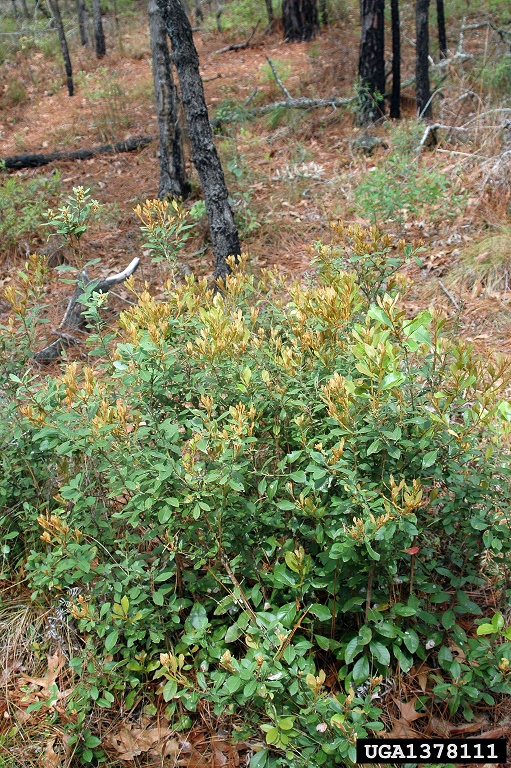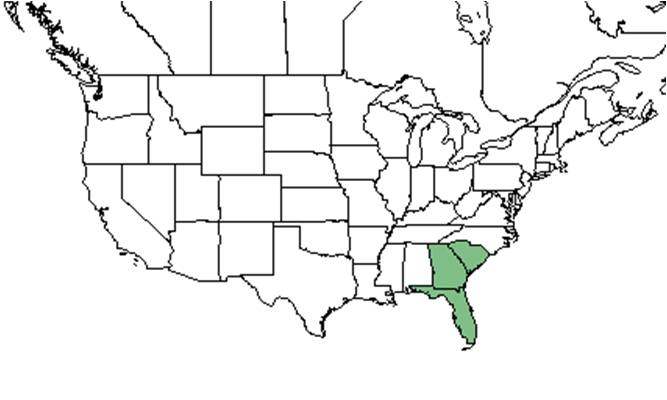Lyonia ferruginea
| Lyonia ferruginea | |
|---|---|

| |
| Photo by Chris Evans, University of Illinois, Bugwood.org | |
| Scientific classification | |
| Kingdom: | Plantae |
| Division: | Magnoliophyta - Flowering plants |
| Class: | Magnoliopsida – Dicotyledons |
| Order: | Ericales |
| Family: | Ericaceae |
| Genus: | Lyonia |
| Species: | L. ferruginea |
| Binomial name | |
| Lyonia ferruginea (Walter) Nutt. | |

| |
| Natural range of Lyonia ferruginea from USDA NRCS Plants Database. | |
Common name: rusty staggerbush
Contents
Taxonomic notes
The species name is Latin for rust-colored, which refers to the rusty appearance on the abaxial side of the leaf [1].
Description
A description of Lyonia ferruginea is provided in The Flora of North America.
Distribution
Populations can be found in south South Carolina, southeast Georgia, and Florida [1].
Ecology
Habitat
In the Coastal Plain in Florida, L. ferruginea can occur in coastal dunes, titi thickets, longleaf/saw palmetto flatwoods, shrub bogs, live oak scrub sand ridges, and xeric scrubs. It has been found to occur in disturbed areas such as roadsides and powerline corridors (FSU Herbarium). Soil types include sandy loam, loamy sand, peat and white sand (FSU Herbarium). Associated species include Cyrilla, Cliftonia, Rhododendron, Myrica, Lyonia lucida, L. fruticosa, Ilex glabra, Pinus clausa, Quercus chapmanii,, Q. myrtifolia, Ilex ambigua, Serenoa repens, Pinus elliottii, Ilex coriaca, Liquidambar styraciflua, Quercus nigra, Q. incana, Gelsemium sempervirens, Smilax bona-nox, S. pumila, Ptderidium aquilinum, and Aristida stricta (FSU Herbarium).
Phenology
It has been observed flowering January through April and fruiting January through November (FSU Herbarium).
Seed dispersal
Seed bank and germination
Fire ecology
Pollination
The following Hymenoptera families and species were observed visiting flowers of Lyonia ferruginea at Archbold Biological Station (Deyrup 2015):
Apidae: Apis mellifera, Bombus impatiens
Colletidae: Colletes brimleyi, C. productus
Halictidae: Agapostemon splendens, Augochlorella aurata, Augochloropsis sumptuosa
Megachilidae: Megachile xylocopoides
Sphecidae: Oxybelus laetus fulvipes, Stictiella serrata, Tachysphex apicalis
Vespidae: Stenodynerus lineatifrons
Use by animals
Diseases and parasites
Conservation and Management
Cultivation and restoration
Photo Gallery
References and notes
Deyrup, M.A. and N.D. 2015. Database of observations of Hymenoptera visitations to flowers of plants on Archbold Biological Station, Florida, USA.
Florida State University Robert K. Godfrey Herbarium database. URL: http://herbarium.bio.fsu.edu. Last accessed: October 2015. Collectors: Jame Amoroso, Loran C. Anderson, L. Baltzell, Tom Barnes, Linnie E. Beck, James R. Burkhalter, Andre F. Clewell, George R. Cooley, Steven P. Christman, Delzie Demaree, R.J. Eaton, Suellen Folensbee, Mark A. Garland, Angus Gholson, Robert K. Godfrey, D.W. Hall, Walter S. Judd, Robert Kral, H. Kurz, O. Lakela, Robert L. Lazor, Robert J. Lemaire, S.W. Leonard, Fred L. Lewton, Sidney McDaniel, Joseph Monachino, R.A. Norris, Kent D. Perkins, P.L. Redfearn Jr., Ann Redmond, Grady W. Reinert, Cecil R. Slaughter, Bian Tan, L.B. Trott, Kenneth A. Wilson, Carroll E. Wood, Jean Wooten. States and Counties: Florida: Bay, Clay, Columbia, Duval, Flagler, Franklin, Gulf, Hernando, Highlands, Jefferson, Lake, Leon, Levy, Liberty, Marion, Okaloosa, Orange, Osceola, Pinellas, Putnam, St. Johns, Sumter, Suwannee, Taylor, Volusia, Wakulla, Walton. Compiled by Tall Timbers Research Station and Land Conservancy.